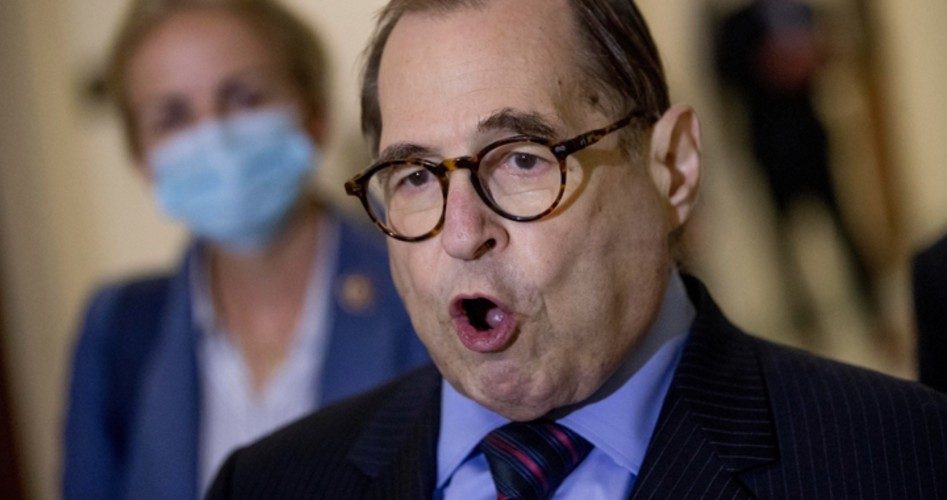
If President Trump nominates and the Senate confirms a new Supreme Court justice to replace leftist heroine Ruth Bader Ginsburg, Representative Jerry Nadler, the Democrat from New York, wants to party like it’s 1937.
Like Franklin Delano Roosevelt, Nadler says Congress should pack the high court to ensure it renders decisions to Nadler’s liking, and therefore proposes expanding the number of seats. That way, a President Biden could nominate another justice or justices to ensure a permanent leftist majority.
Meanwhile, Biden says confirming a nominee would be an “abuse of power,” a 180-degree turn from his position in 2016. Four years ago, he said the Senate must perform its constitutional duty to advise and consent on a Supreme Court justice even in the months before an election.
In other words, Biden was for confirming justices as an election approached before he was against it.
Nadler Tweet
Nadler unbosomed his court-packing plan on Twitter:
If Sen. McConnell and @SenateGOP were to force through a nominee during the lame duck session—before a new Senate and President can take office—then the incoming Senate should immediately move to expand the Supreme Court. 1/2 https://t.co/BDYQ0KVmJe
— Rep. Nadler (@RepJerryNadler) September 19, 2020
Why the Senate doing its constitutional duty would be “force[ing] through a nominee” we are not given to know, but that aside, Twitter users suggested that Nadler might regret the decision to expand the court.
Dangerous game you’re playing. If the GOP keeps the Senate and the Executive Branch what stops them from increasing the Supreme Court to 11 or 13 and installing their choices? I have always wondered if you ever think about the unintended consequences? Apparently you don’t.
— Jack Kane (@JackKan69731336) September 19, 2020
Like fellow failed court packer FDR, Nadler is quite familiar with playing dangerous games. In July, he called the Marxist violence in Portland a “myth.”
Rioters have waged a street war against cops in the city ever since; one of them murdered a Trump supporter in cold blood.
Abuse of Power
Meanwhile, Biden says the next president should nominate Ginsburg’s replacement, apparently thinking he might prevail on November 3.
“As a nation, we should heed her final call to us, not as a personal service to her, but as a service to the country, our country, at a crossroads,” Biden said of Ginsburg’s “fervent last wish” to delay the selection. “There is so much at stake.”
“To jam this nomination through the Senate is just an exercise in raw political power. And I don’t believe the people of this nation will stand for it,” he continued. “If President Trump wants to put forward a name now, the Senate should not act until after the American people select their next president, their next Congress, their next Senate.”
“Don’t vote to confirm anyone nominated,” Biden said in an appeal to Senate Republicans. “Uphold your constitutional duty, your conscience. Let the people speak. Cool the flames that have been engulfing our country.”
In fact, the Senate’s “constitutional duty” is to fill the vacancy on the court. The Constitution says nothing about honoring the dying justice’s wishes, or that the president mustn’t nominate a justice because an election approaches. And Biden could help cool the flames by telling the leftists rioting in the streets — and who will undoubtedly vote for him — to stop burning and looting.
But all that aside, Biden had a different opinion in 2016.
Speaking at Georgetown University, Biden declared that voting on President Obama’s election-year nominee, Merrick Garland, was “a matter of the Senate fulfilling its constitutional responsibility.”
Biden firmly stated that the Senate has a constitutional obligation to discharge its duty of advise and consent, coming election regardless:
I made it absolutely clear that I would go forward with the confirmation process, as chairman — even a few months before a presidential election — if the nominee were chosen with the Advice, and not merely the Consent, of the Senate — just as the Constitution requires.
My consistent advice to Presidents of both parties — including this President — has been that we should engage fully in the constitutional process of Advise and Consent. And my consistent understanding of the Constitution has been the Senate must do so as well. Period. They have an obligation to do so.
Biden also bragged that he supervised or helped supervise, as chairman or ranking member of the Judiciary Committee, the confirmation hearings of nine nominees, more than anyone else:
Some I supported; a few I voted against. And in all that time, every nominee was greeted by committee members. Every nominee got a committee hearing. Every nominee got out of the committee even if they didn’t have sufficient votes to pass within the committee. Because I believe the [Constitution] says the Senate must advise and consent. And every nominee, including Justice Kennedy in an election year, got an up and down vote.
H/T: National Pulse
Photo: AP Images
R. Cort Kirkwood is a long-time contributor to The New American and a former newspaper editor.


